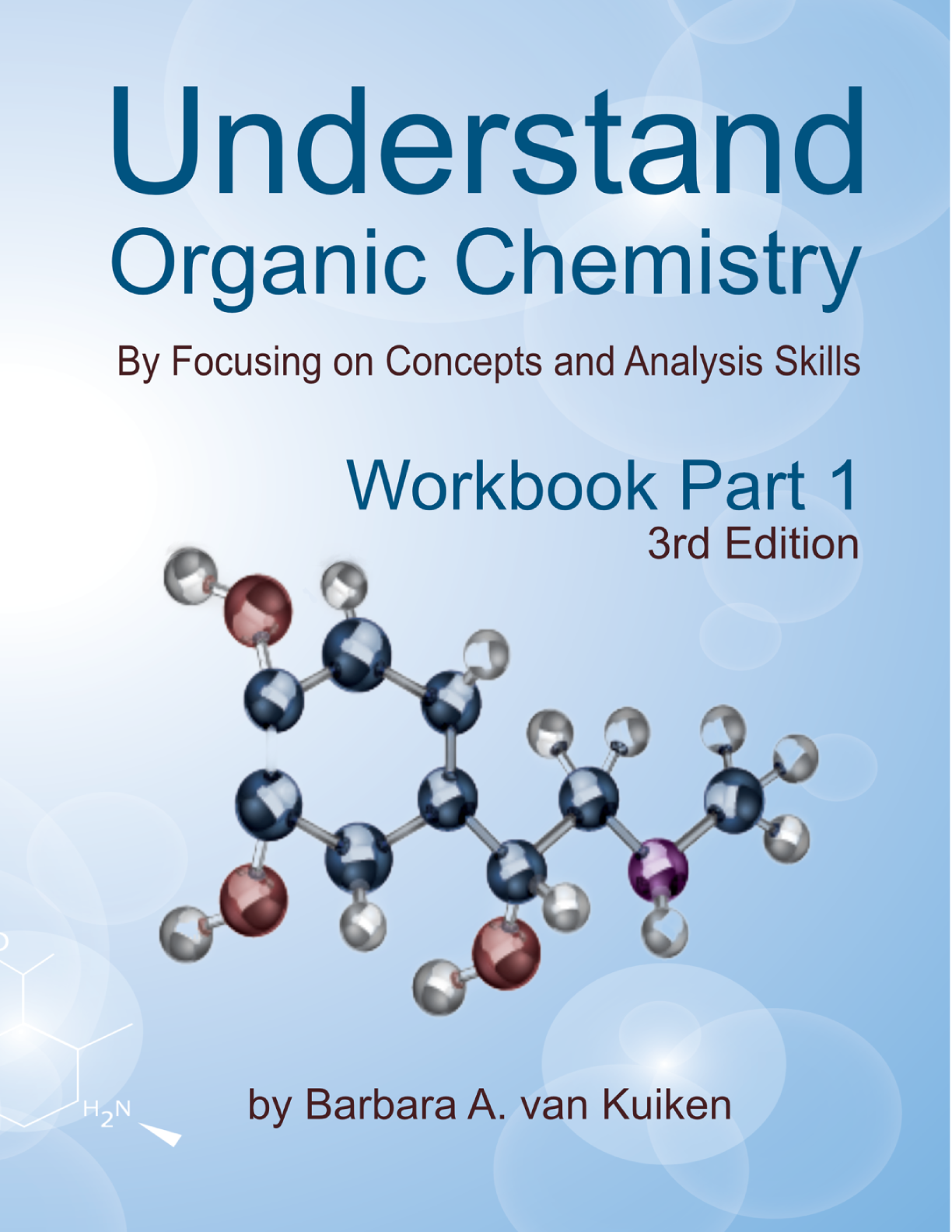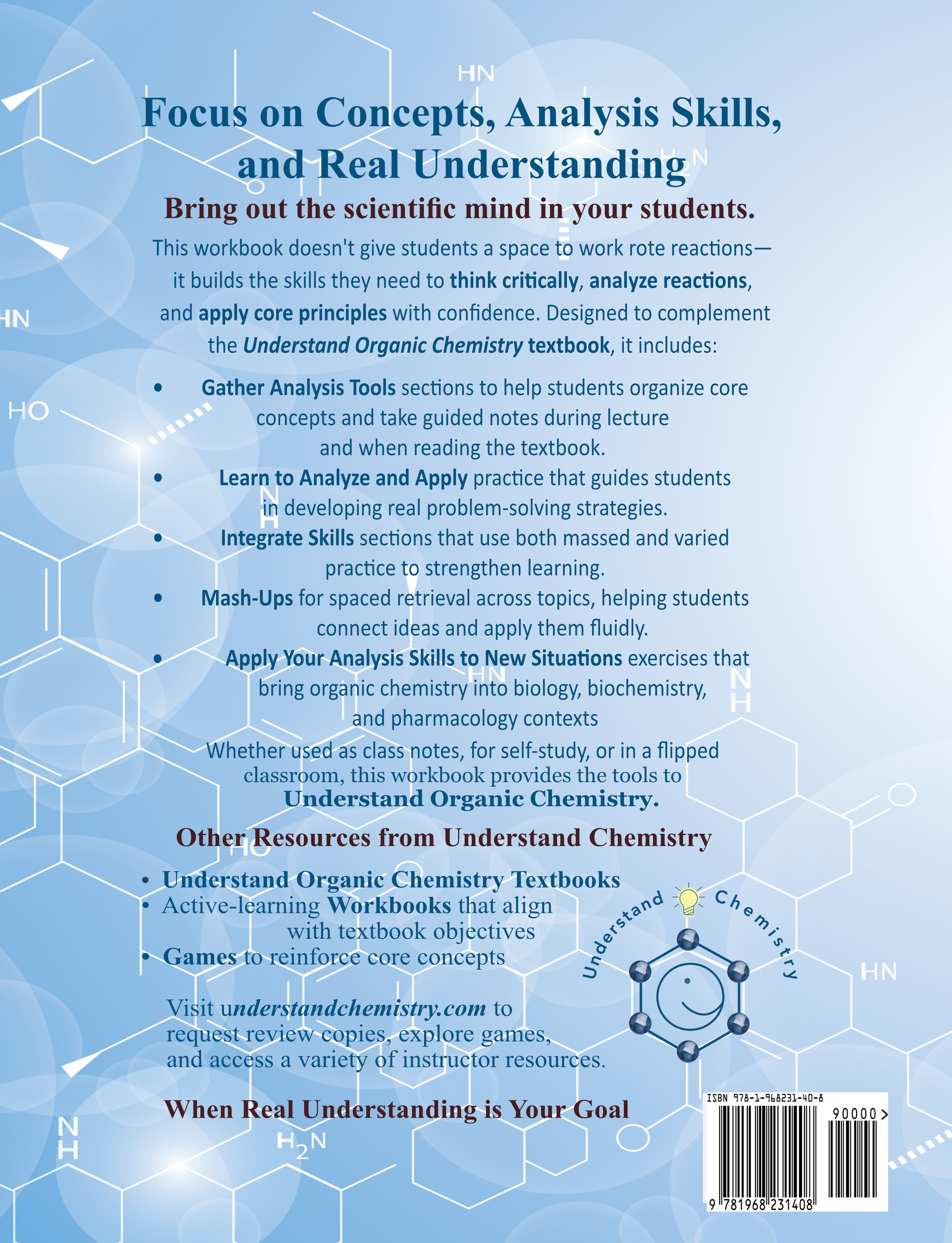 Image 1 of 2
Image 1 of 2

 Image 2 of 2
Image 2 of 2



Understand Organic Chemistry – by Focusing on Concepts and Analysis Skills Workbook Part 1
Focus on Concepts, Analysis Skills, and Real Understanding
Bring out the scientific mind in your students.
This workbook doesn't give students a space to work rote reactions—
it builds the skills they need to think critically, analyze reactions, and
apply core principles with confidence. Designed to complement
the Understand Organic Chemistry textbook, it includes:
Gather Analysis Tools sections to help students organize core concepts and take guided notes
during lecture and from the textbook.Learn to Analyze and Apply practice that guides students in developing real problem-solving
strategies.Integrate Skills sections that use both massed and varied practice to strengthen learning.
Mash-Ups for spaced retrieval across topics, helping students connect ideas and apply them
fluidly.Apply Your Analysis Skills to New Situations exercises that bring organic chemistry into biology, biochemistry, and pharmacology contexts
Whether used as class notes, for self-study, or in a flipped classroom, this workbook provides the tools toUnderstand Organic Chemistry.
Understand Organic Chemistry Workbook Part 1 Focuses on concepts and application skills related to Nomenclature, Stereochemistry, Principles of Reactions, Identifying Reactive Features, Representing Reaction Mechanisms, and Strategies for Stabilizing a Carbocation - including Hyperconjugation, Shifts, Sharing non-bonded electrons, and Resonance.
Reactions used for analysis practice include electrophilic addition, halogenation, hydration, H2O2 with HBr, halohydration, alkoxymercuration, hydroboration-oxidation, and 1,2-1,4 addition reactions.
Understand Organic Chemistry Workbook Part 1 Focuses on concepts and application skills related to Nomenclature, Stereochemistry, Principles of Reactions, Identifying Reactive Features, Representing Reaction Mechanisms, and Strategies for Stabilizing a Carbocation - including Hyperconjugation, Shifts, Sharing non-bonded electrons, and Resonance.
Reactions used for analysis practice include electrophilic addition, halogenation, hydration, H2O2 with HBr, halohydration, alkoxymercuration, hydroboration-oxidation, and 1,2-1,4 addition reactions.
Focus on Concepts, Analysis Skills, and Real Understanding
Bring out the scientific mind in your students.
This workbook doesn't give students a space to work rote reactions—
it builds the skills they need to think critically, analyze reactions, and
apply core principles with confidence. Designed to complement
the Understand Organic Chemistry textbook, it includes:
Gather Analysis Tools sections to help students organize core concepts and take guided notes
during lecture and from the textbook.Learn to Analyze and Apply practice that guides students in developing real problem-solving
strategies.Integrate Skills sections that use both massed and varied practice to strengthen learning.
Mash-Ups for spaced retrieval across topics, helping students connect ideas and apply them
fluidly.Apply Your Analysis Skills to New Situations exercises that bring organic chemistry into biology, biochemistry, and pharmacology contexts
Whether used as class notes, for self-study, or in a flipped classroom, this workbook provides the tools toUnderstand Organic Chemistry.
Understand Organic Chemistry Workbook Part 1 Focuses on concepts and application skills related to Nomenclature, Stereochemistry, Principles of Reactions, Identifying Reactive Features, Representing Reaction Mechanisms, and Strategies for Stabilizing a Carbocation - including Hyperconjugation, Shifts, Sharing non-bonded electrons, and Resonance.
Reactions used for analysis practice include electrophilic addition, halogenation, hydration, H2O2 with HBr, halohydration, alkoxymercuration, hydroboration-oxidation, and 1,2-1,4 addition reactions.
Understand Organic Chemistry Workbook Part 1 Focuses on concepts and application skills related to Nomenclature, Stereochemistry, Principles of Reactions, Identifying Reactive Features, Representing Reaction Mechanisms, and Strategies for Stabilizing a Carbocation - including Hyperconjugation, Shifts, Sharing non-bonded electrons, and Resonance.
Reactions used for analysis practice include electrophilic addition, halogenation, hydration, H2O2 with HBr, halohydration, alkoxymercuration, hydroboration-oxidation, and 1,2-1,4 addition reactions.
